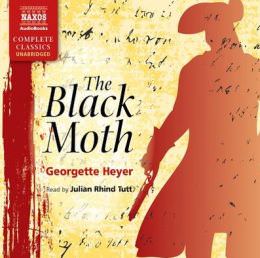Although I’m a long-term reader and fan of Georgette Heyer’s romances, there are a couple that, for reasons I can’t fathom, passed me by, and The Black Moth is one of them. So I’ve come to the audio completely fresh, as it were, not having read the book previously. I don’t know if that’s made a difference to my perception of it: looking at the number of poor-to-middling reviews on Goodreads makes me wonder if it has, because I thought this audiobook was a delight from start to finish.
The storytelling itself isn’t perfect and the action does jump around a bit. That said however, I was so quickly wrapped up in the story of the honourable Earl who lies to protect his brother and do right by the woman they both want to marry, that I was more or less unaware of any abrupt cuts or shifts of POV.
The Black Moth is Heyer’s first published novel, and on the whole, is an incredibly assured piece of work for a nineteen-year-old. Yes, there are things that speak of her youth. For example, some of the characterisation is weak, there are some parts of the book in which there is far more telling than showing, and there is the aforementioned jumping around but overall, I found this to be an enjoyable and rewarding listen.
One of the things I particularly enjoy about reading and listening to books that were written decades ago is the way in which the authors seemed more able to take their time to set up their stories and to build their characters. I remember saying something similar in my review of The Devil on Horseback by Victoria Holt; perhaps to a younger reader or listener, this is “slow”, but for me, it’s a luxurious experience, and something to be savoured.
The story itself is fairly simple. Six years previously the hero, Jack Carstares, Earl of Wyncham, was accused of cheating at cards and, having admitted his guilt to such a terrible breach of the code of honour, fled the country. I suppose such a thing is inconceivable today, but it seems such things were taken very seriously back in the 18th century! Jack has spent the intervening years roaming Europe living on his wits and from his ill-gotten gains as a Gentleman of the Road – or highwayman. The thing is – Jack wasn’t guilty. He was covering up for his younger brother who, in a fit of panic, had been desperate enough to cheat and who, when Jack was accused, said nothing.
Jack’s brother, Richard, married the lovely Lavinia, who leads him a merry dance, being petulant and demanding, and as the years have progressed, he has become more and more weighed down by his guilt. And then, one year ago, the brothers met again when Jack unknowingly held up Richard’s coach, and since then, Richard has been struggling with his conscience even more.
For his part, Jack has not been too sorry with the way his life has panned out until he rescues a damsel in distress from the evil clutches of the villain, falls in love, and realises he has nothing to offer her.
The multiple plot threads are woven together very well, and although I thought the hero and heroine were rather two-dimensional characters, many of the others are superbly drawn, not least of which are Richard and Lavinia, and the villain of the piece, the roguish Tracy Belmanoir, Duke of Andover, who is, surely, the blueprint for all those rakish, darkly attractive, amoral heroes who continue to grace the pages of many a historical romance.
It’s Belmanoir who supplies the novel’s title, although he is only referred to as a “Black Moth” a few times in the text. I suppose it is rather odd that the book is named after him, but his is such a pervading influence, especially when it turns out that he has been pulling a number of the strings all along, that I suppose it’s as good a title as any. As so often happens, the villain of the piece is the most compelling character, although he’s run a close second by Richard, whose increasing despair and crisis of conscience are very skilfully portrayed, presenting a well-realised picture of a man on the verge of a breakdown.
Julian Rhind-Tutt is a well-known face on British television, although I’ve never listened to him narrating an audiobook before. His performance is excellent and very well-tailored to this particular title, principally because he has a real gift for bringing out the irony in a very dry way. There were times I thought his delivery was just a tad slow, but it nonetheless worked; he has a splendid way with what I call the “dandy drawl” à la Percy Blakeney (I’m thinking Leslie Howard in the 1934 film, here!), an affectation of speech often attributed to the dandy set in Heyer’s work (and other authors whose books are set in the Georgian and Regency periods). Mr Rhind-Tutt’s characterisations are all very distinct, although I have to admit, his performance of Lavinia did tend to grate on the ears. I imagine, however, that was deliberate, as she is definitely a character who tends to grate on the nerves! I really liked his interpretation of Jack’s friend, Sir Miles O’Hara (complete with an excellently maintained Irish accent), and the way he voiced Tracy Belmanoir was spot on – soft, rather oily and somewhat threatening. He does not raise the pitch of his voice very much for the females (other than Lavinia, although it’s only a little), simply adopting a softer tone to delineate the women, which, for the most part, works well. There was one point where I felt that the hero and heroine sounded too close in register, but it was easy enough to tell them apart because of the difference in timbre.
While The Black Moth may not be perfect, I think it’s stood the test of time well, given it’s almost one hundred years old! (It was first published in 1921) Ms Heyer’s trademark wicked sense of irony is already present, as is the wonderful way she pokes fun at the overblown and ridiculous. For someone so young, she already shows a remarkable knowledge of the period (and of swordplay, in the fencing scene towards the end) and all in all, I thought it was a splendid yarn with Julian Rhind-Tutt’s performance striking exactly the right note.
I’ve listened now to all three of the unabridged Heyer recordings issued by Naxos over the past year or so (the others being Sylvester and The Grand Sophy
), and have enjoyed them all very much. Now, if I ask very nicely, perhaps the lovely people at Naxos could turn their attention to producing an unabridged version of Venetia
.
Caz
Narration: A-
Book Content: B
Steam Factor: You can play it out loud
Violence: None
Genre: Historical Romance
Publisher: Naxos Audiobooks
The Black Moth was provided to AudioGals for review by Naxos Audiobooks.





I am very fond of The Black Moth…….great review.
Is the unabridged version of The Grand Sophy a new recording? It was my first Heyer and I love it with all my heart, but I have never listened to it in audio.
Would love an unabridged version of Venetia with a female narrator. I am the lone person on the planet not enamored of Richard Armitage.
Thanks, Leslie.
Yes, The Grand Sophy is a new recording, also from Naxos. My review of it appeared at All About Romance, so if you go over there and search for it you should find it easily. I really liked it.
I don’t mind the Armitage Venetia, I just wish there was a good unabridged version, as it’s my favourite Heyer. I agree it should probably be a female narrator, although I think a carefully chosen male narrator could work, too.
I got very excited after the first three were released in quick succession hoping more would follow close on their heels fingers crossed as all are excellent. Venetia is definitely high on ny just along with Faro’s Daughter – can’t bring myself to listen to abridged versions when I know and love each word of the full text and don’t want to give any of them up! Thank you Naxos, but don’t stop yet.
I have asked Naxos if there are any more in the pipeline :) I know there are audio versions of quite a few of Heyer’s books, but there are still gaps to be filled and some, like the recording of “Regency Buck” which are badly in need of a new version.
Venetia at last in unabridged, happy dance. Experienced Heyer narrator, Phyllda Nash, is excellent as always. The Masqueraders now also in full, another favourite of mine. The narration, ok, it grew on me but not quickly. I wish they had chosen a male narrator for a book with very few female characters and one of those in character of a man for so much of the book. I look forward to the reviews of these titles – especially Venetia, which appears to be a favourite for so many.
I haven’t had a chance to listen to Venetia yet, but my review of The Masqueraders should be up soon. I had some reservations initially, but like you, the narration grew on me.